It’s quite annoying to hear a creaking noise when braking at a low speed. But more than anything else, it makes drivers worry. What does it mean when you hear a noise when braking at low speed?
If you hear noise when braking at low speed, it can indicate worn-out brake pads. If the brake pads have been used for a long time and are worn out, it’s best to replace them immediately. Ignoring the grinding and squeaky noises that your brake produces can result in trouble or danger.
Read on to learn more about the meaning of brake noise when braking slowly, including its causes and how to fix it.
Noise When Braking at Low Speed
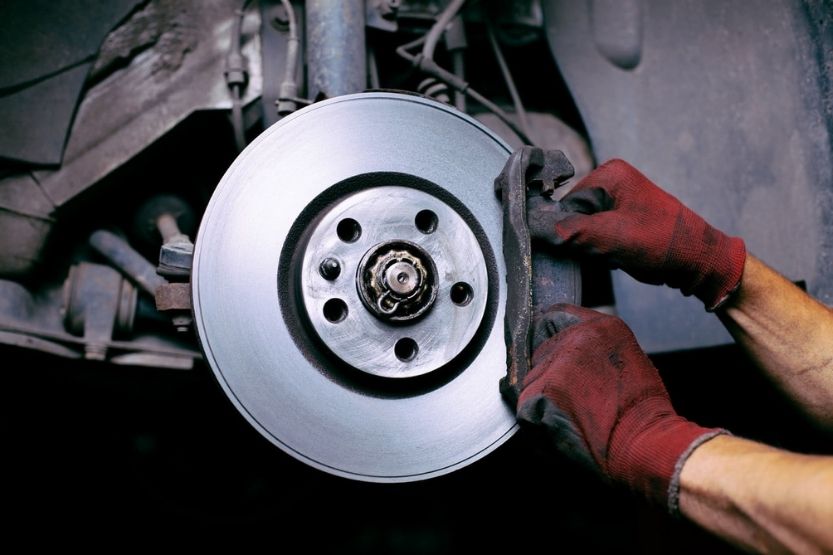
When your car produces a noise when braking at low speed, it likely has worn-out braking pads. If they have been used for a long time and are worn out, it’s recommended that you replace them immediately. Ignoring the scraping, grinding, and squeaky noises your brake produces can be hazardous.
One of the common car issues drivers experience is the squeaky, squealing, or grinding noise when braking at low speed. Surely, it can be bothersome since a problem with the brakes is serious and should not be ignored. However, if you notice it early, there’s no reason to feel terrified as long as you make sure that you address it immediately too.
Types of Noises That the Braking System Makes
Let’s discuss the different types of noises that the braking system makes. These include:
- Squeaky Noise
- Squealing Noise
- Grinding Noise
Being familiar with these will give you a better idea about your car’s braking issues.
1. Squeaky Noise
Do you hear your vehicle making a squeaky or scraping sound when braking at low speed? The issue most likely has something to do with the brake pads. Your pads are probably of low quality, and, in most cases, these brakes have huge metal flakes in them.
When the brake comes in contact with the rotor, it will make a squeaky or scraping sound. This doesn’t happen if you have high-quality brake pads.
Is it bad? Yes, because as long as you hear the noise, the rotor continuously gets into contact with the metal flakes. This eventually damages the rotor. Also, if the brake’s wear indicator goes off, you need to change your brake pads immediately.
It’s best to get top-of-line brake pads to prevent the rotor from getting seriously damaged.
2. Squealing Noise
The noise coming from your car brakes may have something to do with your usual parking area. If you usually park in a wet area, the chances are that your car’s metal surfaces get in contact with water for a long time. This eventually rusts your car’s metal surfaces and produces a creaking or squeaking noise as you brake.
However, the rust layer can fall off. If this happens, the squealing noise when you brake at a low speed may disappear. If it does disappear, it doesn’t mean that it’s alright to ignore it.
The fact that there’s rust in your car is not good. It will affect your brakes, but it can damage other parts of your car. In which case, always avoid wet parking areas as much as you can.
3. Grinding
Do you hear a grinding noise when braking at low speed? It should not be ignored if you hear a grinding noise coming from your car’s braking system. You have to stop your vehicle once you hear it.
This means that your brakes are all used up. The caliper and the rotor are the only ones left in the whole braking system. In which case, you have to stop your vehicle to avoid road accidents.
Car Making a Creaking Noise When Driving Slow [7 Causes]
Why Does My Car Produce Noise When Braking at Low Speed?
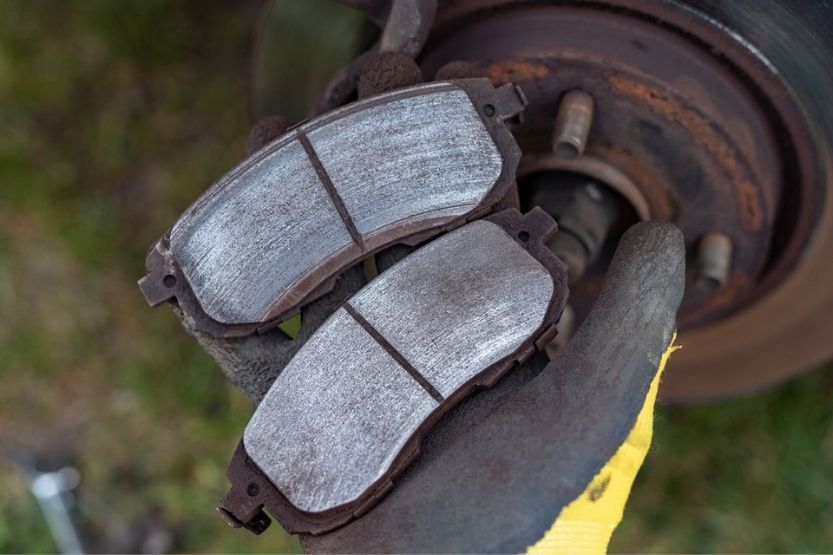
There are several reasons why your car produces a noise when braking at a low speed. Here are some of them:
- Worn Out Brake Pads
- Low-quality Brake Pads
- Used Up Rotor Disks
- Broken Shims
- Dried Caliper Screws
- Vehicle Parked for Too Long
- Debris Between the Rotor and Brake Pads
1. Worn Out Brake Pads
Worn-out brake pads are common reasons your car produces a noise when braking at low speed. When you hear the noise, it most likely means that you need to replace your brake pads as soon as possible.
The materials used for making brake pads consist of iron, copper, and graphite. These elements are combined to produce pads. High-quality brake pads are durable but also wear out with time.
Once brake pads wear out, the clipper’s metal comes in contact with the rotor. This then results in that squeaky noise that you hear.
2. Low-quality Brake Pads
Manufacturing brake pads require specific materials with specific ratios. Big and well-known manufacturers are capable of doing this. Unfortunately, some manufacturers do not have the appropriate equipment to maintain those ratios. This then results in low-quality products.
This is why you won’t be able to achieve precise accuracy with brake pads of low quality. It’s easy to detect if you have one because it will make awful noises every time you brake at a low speed.
3. Used Up Rotor Disks
Another common cause of noise when braking at low speed is used up rotor disks. Used-up rotor disks usually occur when you have low-quality brake pads. As the brake pads continuously contact the rotor disks, they will eventually have scratches.
So, if you can avoid it, never use low-quality brake pads. Also, if your vehicle is still hot, don’t wash it with cold water because this can result in surface deflection.
4. Broken Shims
Shims are placed between the brake pads and the caliper to eliminate noise. Suffice to say that the brake system will produce sounds if the shims are broken.
5. Dried Caliper Screws
A brake noise when braking slowly can be caused by dried caliper screws. If the caliper screws and bolts produce scraping sounds, they lack lubrication. It’s possible to lubricate it on your own. But if you’re not sure how to do it, it’s always best to bring your car to a car care center.
6. Vehicle Parked for Too Long
If your car is parked for too long, it will most likely catch air full of vapors. This can result in rust and corrosion. If this happens, you will notice squealing noises every time you brake, especially at low speed.
The noise can disappear when the rust layer falls off. However, we all know that the presence of rust on our vehicles is not at all good.
7. Debris Between the Rotor and Brake Pads
Another prevalent cause of brake noises when braking at low speeds is debris between the rotor and brake pads. This is particularly true if you use your car every day and pass by polluted areas. Even if we want to, it’s hard to avoid tiny rocks, sand, dirt, and other types of debris. They can get between the rotor and brake pads, which cause grinding sounds.
There are times when the grinding noise doesn’t stop even when you’re not stepping on the brake. This can be an indication that your vehicle already needs some serious cleaning.
Again, what causes noise when braking at low speed? The cause of noise when braking at low speed is worn brakes. Cars and trucks are fitted with metal brake pad wear indicators. When the brake pads wear out enough, this metal tab contacts the brake rotor and produces a squeaking noise.
How Can I Fix the Brake Noise?
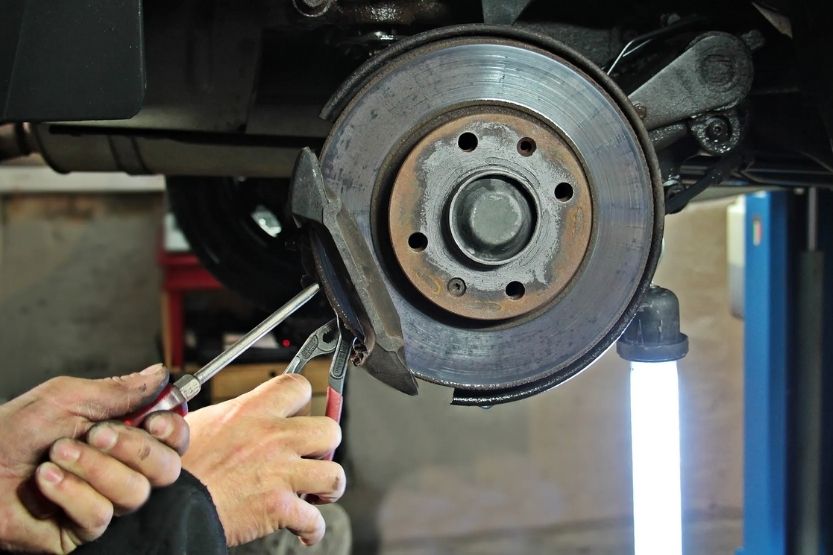
Here’s one way of fixing your brake noise problem. I’ve broken them down into five steps, which include the following:
- Identify the Loose Parts
- Apply Dampening Paste
- Inspect the Brake Pads
- Check Out the Rotor
- Exert an Extra Effort to Look for Other Possible Reasons Behind the Brake Noise
1. Identify the Loose Parts
The first step is to identify the loose parts to know why that annoying brake noise. But to do so, you first have to dismantle the entire front wheel. That way, you can conveniently wiggle all the braking system components.
So, how would you know if there’s nothing wrong with your braking system? The components should all be intact and tightly installed. This means that any part of it shouldn’t move when you try to wiggle it. Otherwise, there’s a loose part that needs to be fixed.
2. Apply Dampening Paste
Once you have identified the loose parts, you can apply a dampening paste to reduce or eliminate wiggling.
The dampening paste is a water-based compound. You can apply it thinly and evenly on the rear of the brake pads. It dries for about three hours. After which, you can start reassembling the braking system.
3. Inspect the Brake Pads
Conduct a thorough inspection of the brake pads to confirm whether they are worn out. You can try to sand it down too before you replace them. If the noise doesn’t disappear, then they need immediate replacement.
4. Check Out the Rotor
Check out the rotor, too, to confirm if there’s damage. You have to inspect it too, to know if it is too thick for your vehicle. If it is, you need to have it machined.
Remember that you can’t fix the brake rotors anymore if they already have severe damage. So, if yours is broken, you have no other option but to have them replaced.
5. Exert an Extra Effort to Look for Other Possible Reasons Behind the Brake Noise
Since you have already dismantled your car’s braking system, it’s best to thoroughly inspect it for other possible damages. Go the extra mile in checking the brake oil and brake lines. You might not be aware that your car already has insufficient oil. Ignoring this can result in other car issues.
Always ensure that your vehicle has sufficient brake fluid. Also, check if the fluid appears clear and bright. If it isn’t, it means it’s contaminated, and you need to change it.
How Long Can I Go Before I Replace the Brake Pads?
The lifespan of brake pads depends on the type of vehicle and how the driver uses it. For instance, if you are usually stuck in heavy commuter traffic, you often hit the brakes. Doing so tends to wear the brake pads off. Unlike if you drive in rural areas or even on highways, you don’t have to stop every so often.
Some drivers habitually press and depress brakes more often than others. This, of course, wears out the brake pads quickly too.
Brake pads and shoes last for roughly 35,000 miles if the vehicle is driven in urban areas. But if you go on highways or in rural areas all the time, the brake pads can last more than 80,000 miles.
Should I Replace All Four Brake Pads at Once?
You don’t have to replace all four brake pads at once. However, you have to replace both front pads and rear pads simultaneously.
In most vehicles, the front brakes are initially responsible for braking. It’s basically how most vehicle makers design their braking system. Also, it has something to do with physics.
Have you ever noticed how your vehicle’s “nose” comes down when you hit the brakes? It’s called weight transfer. The weight is transferred onto the front of your vehicle as it pushes down with full force on the front wheels. This explains why there are front brakes and why vehicle makers designed them that way.
Suffice to say that the front brake pads are more susceptible to wear and tear. You’ll most likely change them more often than the rear ones.
Conclusion – Brake Noise When Braking Slowly
When your car produces a noise when braking at low speed, you most likely have worn-out brake pads. If they have been used for a long time and are worn out, it’s recommended that you replace them immediately. Ignoring the scraping, grinding, and squeaky noises your brake produces is like waiting for a road accident to happen.
As a driver, it’s not enough that you only know how to drive a vehicle. Make sure that you get to know your car well. That includes being observant of the sound it produces and identifying where the sound comes from.
So, if your car makes a squealing, squeaky, or grinding noise when you brake at low speed, there’s something wrong with your brake pads. If you know how to fix cars, it’s best to address them right away. But if you’re hesitant to look into it on your own, visit your most trusted mechanic real soon.
Related reading:
Brake Pedal Goes to Floor When Engine Running [How to Fix]
Electric Parking Brake [What Is It and How Does It Work?]
Grinding Noise When Braking [9 Possible Causes and How to Fix]
Brake Lights Won’t Turn Off [Causes and How to Fix]

![Grinding Noise When Braking [9 Possible Causes and How to Fix] grinding noise when braking](https://roadsumo.com/wp-content/uploads/2021/06/grinding-noise-when-braking-150x150.jpg)
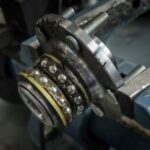
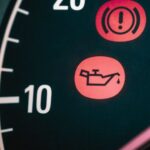
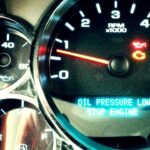

![Low Tire Pressure Light On But Tires Are Fine [Why Is This?] low tire pressure light on but tires are fine](https://roadsumo.com/wp-content/uploads/2021/07/low-tire-pressure-light-on-but-tires-are-fine-150x150.jpg)

![Read more about the article Clicking Noise When Turning [Causes and How to Fix]](https://roadsumo.com/wp-content/uploads/2022/12/clicking-noise-when-turning-300x200.jpg)
![Read more about the article Car Making a Creaking Noise When Driving Slow [7 Causes]](https://roadsumo.com/wp-content/uploads/2022/07/car-making-a-creaking-noise-when-driving-slow-300x200.jpeg)